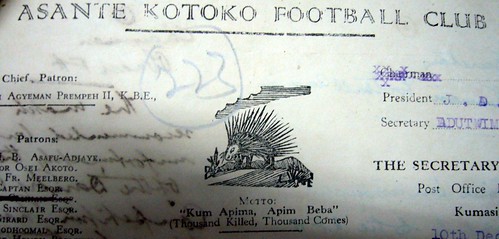Originally written by Katie Greenstreet in 2009
Edited and updated by Lauren Oliveri in 2013
Colonialism
Like many parts of the world, Africa’s first formal introduction to football was through European colonization. [1] Africa is arguably one of the most diverse continents in the world. Even among the multitude of Nigerian languages, a common world for “ball” does not exist. [2] The foreign sport of football unified and liberated African cultures — only after the sport’s initial application as an instrument for colonial control.
Football was introduced officially through mission schools [3]. Missionaries promoted football, believing it to enforce obedience, sobriety, and cooperation [4] while also supporting the philosophies of “rational recreation” and “muscular Christianity.’”[5] Regulating the African people through football aided in maintaining an environment “favorable for continued European presence.”[6]

An example of a mission school in Africa. The game was originally introduced to the native populations by colonizers in institutions like this one.
Inevitably, Africans formed their own teams in an effort to assert independence. However, athletic regulatory institutions helped to reinforce and maintain European dominance over African football development. For instance, during the early 20th century, the Sports Control Board of Zanzibar instituted an appointment process for referees [7]. Referees were kept exclusively European to “help to instill a respect for authority amongst subordinate populations.”[8] Furthermore, Europeans owned everything from stadia to playing fields to equipment, limiting the growth of independent African clubs [4].
However, with the inauguration of an independent African-run football association in Zimbabwe in 1949, independent African football associations began to prevail throughout the continent. [9] African teams liberated from European regulation meant that football evolved into a “vehicle for expressing indigenous aspirations for emancipation and harnessing resentment towards the exploitative and oppressive conditions which typified much of colonial life in Africa.” [10]
Defeating the French in football sparked the quest for Algerian independence [11]. Boycotting matches in Zanzibar challenged colonial authority and provided the motivation for the beginnings of political organization. [12] The Tanzanian Nationalist Party began “discussing strategies aimed at delivering independence” under the guise of their own football club [13]. Football had essentially become the precursor and facilitator for African independence and political change.
Independence
The wind of change is blowing through this continent… this growth of national consciousness is a political fact.
-Harold Macmillan, “Wind of Change” Speech, 1960 [14]
In 1957, Ghana’s newfound freedom sent glimmers of hope to each corner of the continent. Football and freedom became intertwined; “the erection or refurbishment of football stadia in celebration of hard won emancipation provides a tangible illustration of the way that football figured in the construction of national identity in independent Africa… [and the stadia were] named to celebrate the strength of the relationship between the game and nationalist sentiments.” [15] National team names like the Black Stars of Ghana, the Elephants of the Ivory Coast, and the Nigerian Green Eagles also echoed these patriotic attitudes. [16]
Football provides a particularly interesting lens to enable the examination of the rise of African self-governance. This web page hopes to unravel the complex relationship between football, nationalism, and post-colonial African politics.
Click on one of the flags to learn more about its nation’s “soccer politics”!
How to cite this article: Katie Greenstreet, “The Politics of African Soccer,” Soccer Politics Pages,http://sites.duke.edu/wcwp (accessed on (date)).
[1] Boer, Wiebe. “A Story of Heroes, of Epics: The Rise of Football in Nigeria.” Football in Africa: Conflict, Conciliation, and Community. 2004, New York: Palgrave Macmillan.
[2] Boer, “A Story of Heroes.”
[3] Boer, “A Story of Heroes.”
[4] Lord, Jack. “Football in colonial Africa.” Pitch Invasion. 01 Feb 2008. Web. 22 Oct 2013. http://pitchinvasion.net/blog/2008/02/01/football-in-colonial-africa/
[5] Fair, Laura. (1997). “Kickin’ It: Leisure, Politics and Football in Colonial Zanzibar 1900s-1950s.” Africa, 67(2), 224-251.
[6] Darby, Paul. (2005). Africa and the World Cup: FIFA Politics, Eurocentrism and Resistance. International Journal of the History of Sport, 22(5), 883-905.
[7] Fair, Laura. Pastimes and Politics: Culture, Community, and Identity in Post-Abolition Urban Zanzibar, 1890-1945. Athens: Ohio University Press, 2001. Print.
[8] Fair, “Kickin’ It.”
[9] Darby, “Africa and the World Cup.”
[10] Darby, “Africa and the World Cup.”
[11] Darby, “Africa and the World Cup.”
[12] Fair, “Kickin’ It.”
[13] Darby, “Africa and the World Cup.”
[14] Macmillan, Harold. “Wind of Change.” South African Parliament. Cape Town. 3 Feb.1960.
[15] Darby, “Africa and the World Cup.”
[16] Darby, “Africa and the World Cup.”





